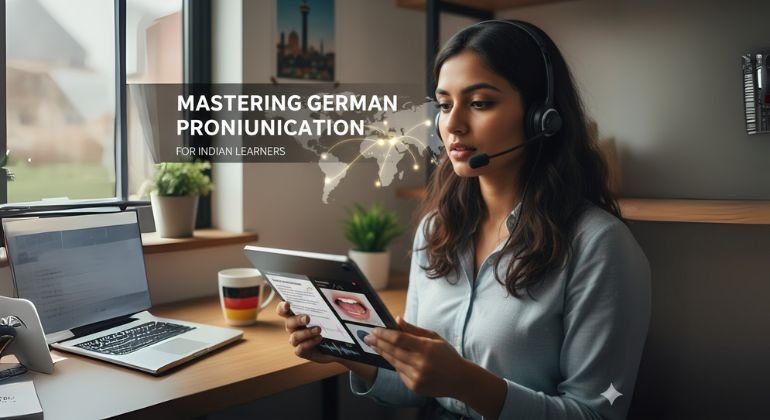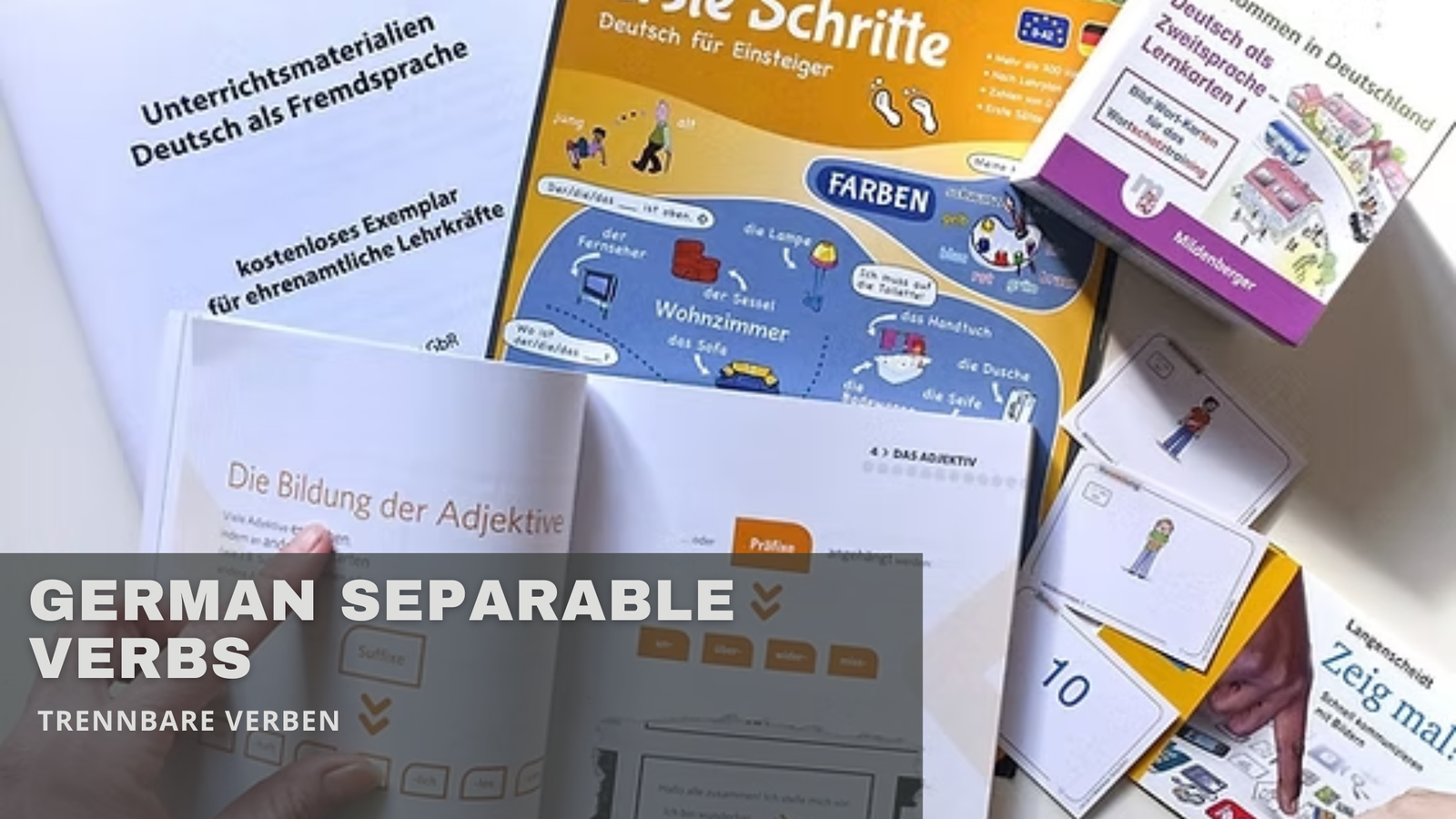When you start learning German, you quickly realize it’s not just about grammar and vocabulary. The way you speak the language—your pronunciation—is just as important. For many learners, especially those from India, certain German sounds can be challenging because they don’t exist in Hindi, English, or other regional languages. Mastering these sounds is key to speaking with confidence, being easily understood by native speakers, and truly integrating into the culture. This guide is your step-by-step roadmap to conquering German pronunciation and sounding more like a local.
The German Vowels (Vokale) and Umlauts
German has five basic vowels (a, e, i, o, u) and three special vowels with two dots on top, called umlauts (ä, ö, ü). Unlike English, German vowels have a very clear and consistent sound. They can be either short or long.
- Long Vowels: A vowel is long when it is followed by a single consonant (e.g., Sohn – son, fragen – to ask) or when it is doubled (e.g., Meer – sea). The ‘h’ after a vowel is also a sign of a long vowel (e.g., gehen – to go).
- Short Vowels: A vowel is short when it is followed by two or more consonants (e.g., Mutter – mother, Tisch – table).
Here’s a quick guide to their sounds:
- a: Sounds like the ‘a’ in “father.” (e.g., haben, Vater)
- e: Short ‘e’ sounds like the ‘e’ in “get.” Long ‘e’ is like the ‘ay’ in “say” but without the glide. (e.g., Bett vs. legen)
- i: Short ‘i’ sounds like the ‘i’ in “it.” Long ‘i’ is like the ‘ee’ in “feet.” (e.g., mit vs. lieben)
- o: Short ‘o’ sounds like the ‘o’ in “pot.” Long ‘o’ is like the ‘o’ in “go” but more rounded. (e.g., kommen vs. rot)
- u: Short ‘u’ sounds like the ‘u’ in “put.” Long ‘u’ is like the ‘oo’ in “moon.” (e.g., Hund vs. rufen)
Now for the tricky umlauts, which are often the biggest hurdle for Indian learners.
- ä: Pronounced like the ‘e’ in “bed” or “get.” (e.g., Äpfel, Mädchen)
- ö: This sound does not exist in English. To make it, start with an ‘a’ sound (like in “say”), and then round your lips as if you were going to say ‘o’. (e.g., schön, hören)
- ü: Again, no direct English equivalent. Start with an ‘ee’ sound (like in “see”) and then round your lips tightly as if you were going to whistle. (e.g., fünf, Tür)
The German Consonants (Konsonanten) That Trip You Up
While many German consonants are like their English counterparts, some have unique pronunciations that require special attention.
- The ‘R’ Sound: This is perhaps the most famous challenge. The German ‘R’ is not a rolled ‘R’ like in some Indian languages, nor is it the soft ‘R’ of American English. It is a throaty, guttural sound, similar to clearing your throat. It’s often compared to the ‘ch’ sound in “Loch Ness.” With practice, you can master this unique sound.
- The ‘ch’ Sound: This sound has two variations:
- The ich-Laut: This “soft ch” is pronounced after the vowels i, e, ä, ö, ü, and after consonants. It’s a soft, hissing sound made by pushing air over the front of your tongue. Think of a very gentle cat’s hiss. (e.g., ich, sprechen)
- The ach-Laut: This “hard ch” is pronounced after the vowels a, o, u, and au. It’s a rougher, guttural sound from the back of your throat. (e.g., machen, Buch)
- The ‘W’ Sound: Unlike in English, the German ‘w’ is pronounced like a ‘v’. (e.g., Wasser – sounds like “vasser”)
- The ‘Z’ Sound: This is a combination of a ‘t’ and an ‘s’ sound. Think of it as a single, quick sound. (e.g., Zitrone – “tsitrone”)
Common Pronunciation Mistakes for Indian Learners
In addition to the specific sounds, there are a few general habits that Indian learners need to adjust to sound more natural:
- Thinking in English: A common mistake is to pronounce German words that look similar to English words with an English accent. For example, “Internet” is a common word, but in German, it’s pronounced with a German accent, not the way you would in English. You must consciously switch your phonetic system.
- Under-enunciating Vowels: English speakers often reduce vowel sounds, especially in unstressed syllables. In German, every vowel is pronounced clearly. Making sure your vowels are distinct will make you much easier to understand.
- The “R” at the end of words: In many regional Indian accents of English, the ‘R’ at the end of words is pronounced clearly. In German, when an ‘R’ comes at the end of a word, it often sounds more like a soft vowel sound. For example, Lehrer (teacher) sounds more like “Lehreh” to a native ear.
- Word Stress and Rhythm: While English has a flexible rhythm, German often has a more even, staccato feel. Stressing the correct syllable (usually the first one, or the root of a compound word) is vital for natural speech.
Practical Tips to Improve Your German Pronunciation
The key to mastering pronunciation is consistent practice. Here are some strategies you can use right away:
- Listen Actively: Don’t just hear German; listen to how words are pronounced. Pay attention to native speakers in German films, TV shows (like Dark on Netflix), and podcasts. Mimic their sounds.
- Use Audio Resources: Websites like Forvo and dict.leo.org allow you to hear individual words pronounced by native speakers. This is a fantastic way to check your pronunciation on the go.
- Record Yourself: Use your phone to record yourself saying German words and sentences. Play it back and compare your pronunciation to that of a native speaker. This helps you identify where you need to improve.
- Work with an Expert: The fastest and most effective way to perfect your pronunciation is with a trained instructor. A teacher can provide real-time feedback and correct your mistakes before they become habits. At The Language Spectrum, our trainers are experienced in identifying and correcting common pronunciation challenges faced by Indian learners.
- Shadowing: A powerful technique where you listen to a native speaker and repeat what they say immediately after, trying to match their rhythm, tone, and sound as closely as possible.
Conclusion
Mastering German pronunciation may seem daunting, but it’s an achievable goal. By understanding the unique sounds of the language and dedicating time to focused practice, you can build the confidence to speak German clearly and effectively. This will not only make your conversations more pleasant but will also help you in your academic and professional life in Germany.
Don’t let pronunciation be a barrier to your success. Join a professional course at The Language Spectrum to get personalized feedback and expert guidance. Your German-speaking future is waiting for you!








